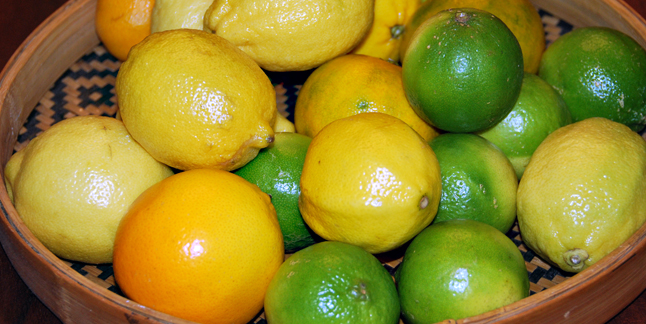
Never mind the Hundred Mile Diet — in November, give me a lime and a lemon and I’m a happy camper. Maybe I suffer from Vitamin C deficiency — limes on board ships, remember, were Captain Cook’s remedy for scurvy, and resulted in the slang term “limey” for the English — but when the days shorten, nothing tastes so good to me as lemon and lime.
Maybe it’s genetic. When I lived in Cali, Colombia, we had a lime tree in the yard. When my mother came to visit, she was so enamoured of the Colombian limes she tried to take a few home to Ottawa with her, packed into her bra cups in her suitcase. The customs agent found them — this was in the days when everyone entering Miami from Bogota endured luggage searches — with great amusement, but no mercy. She still tells the story.
California and Florida produce limes and lemons as well as oranges, and we also import citrus from the Middle East, Australia and Africa. And of course the oranges and little mandarins of various types from Japan and China are famous — but I didn’t ever see a lemon the whole time we were in China, now two years ago—even in Hainan, in the south. Tiny limes yes, and wonderful miniature oranges, sweet and succulent, and piled high in the streets and on wagons. Same as pomelos—those huge woody grapefuit that are tough as beans but wonderfully full of flavour—they’d be stacked ten feet high, in big orange net bags, outside every shop, for about two weeks. In the dry cold Beijing winter, they were heaven.
Just now Cooper’s has in a wonderful batch of limes — great big ones, like small lemons, but round, smooth-skinned, seedless and very juicy. When choosing lemons, look for round, rather than pointy-ended ones, and give them a squeeze. If you can’t compress the lemon a little with your hand, look for another. Like most stuff from California, lemons are picked to ripen in transit, but often don’t. The smooth skinned lemons have more juice than the ones with thick horny rinds. For some reason the thick skins go with hundreds of seeds—as though the lemon knows that it’s going to have to try awfully hard to reproduce, with that thick insensitive outer shell hiding its true personality.




